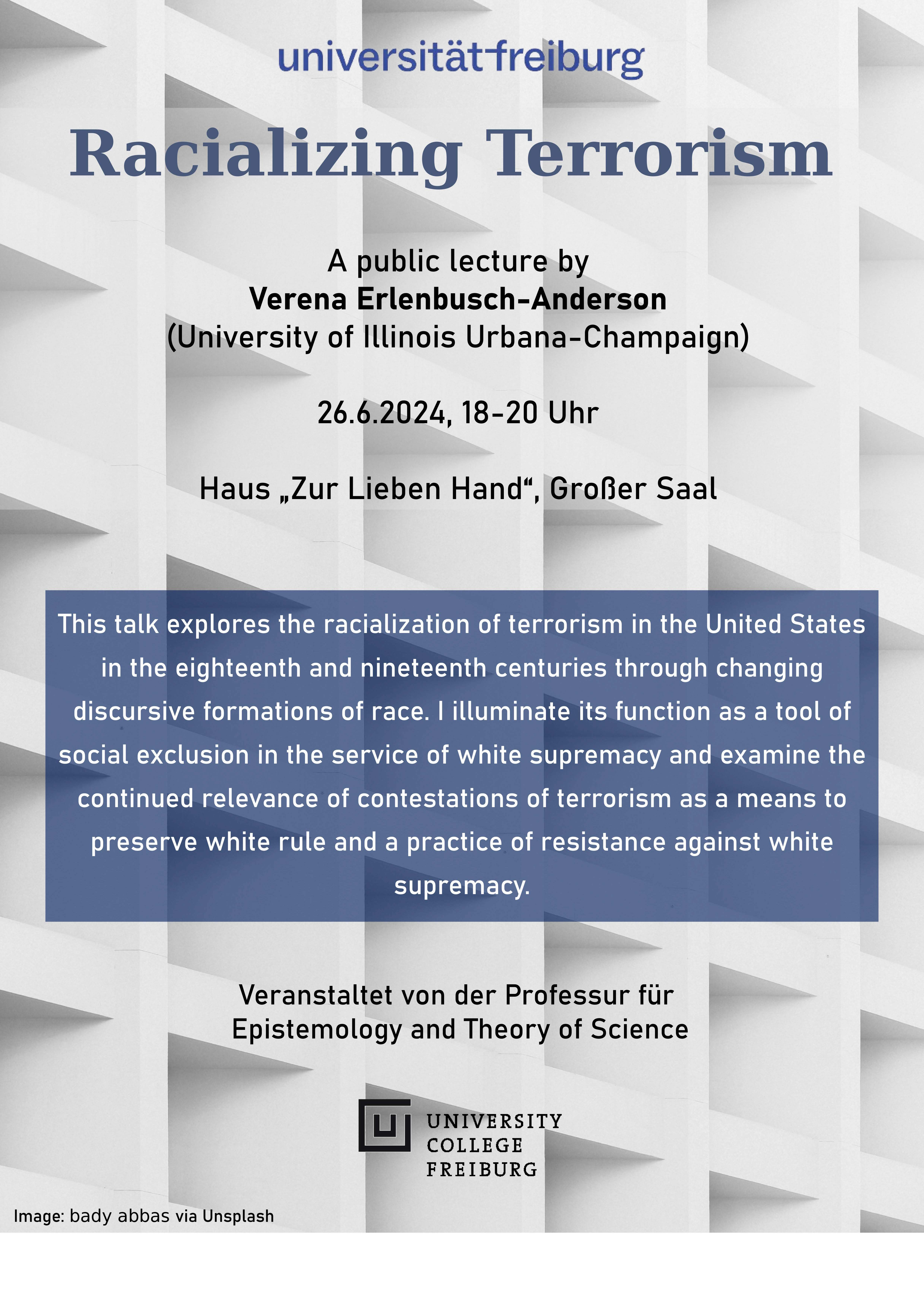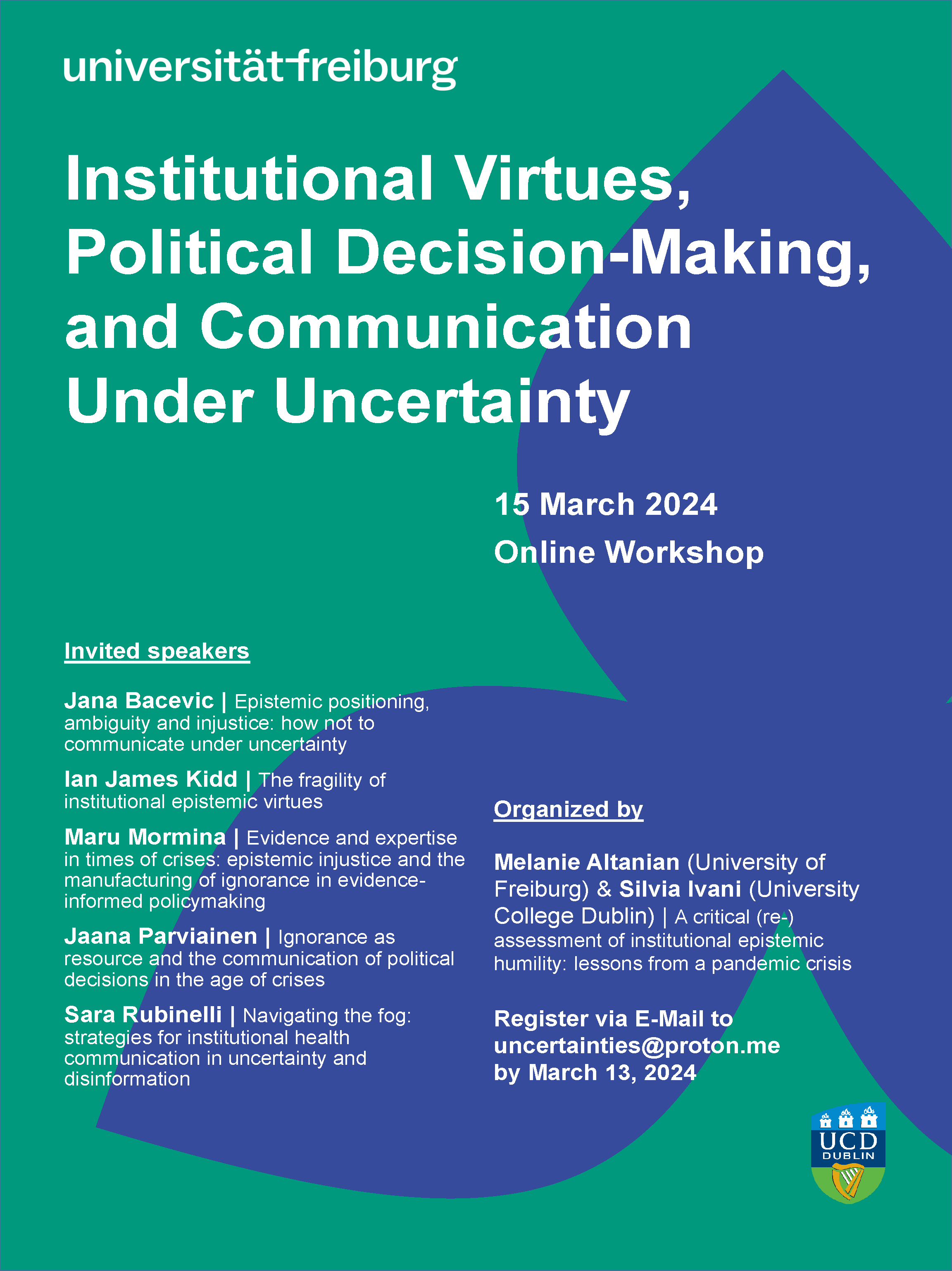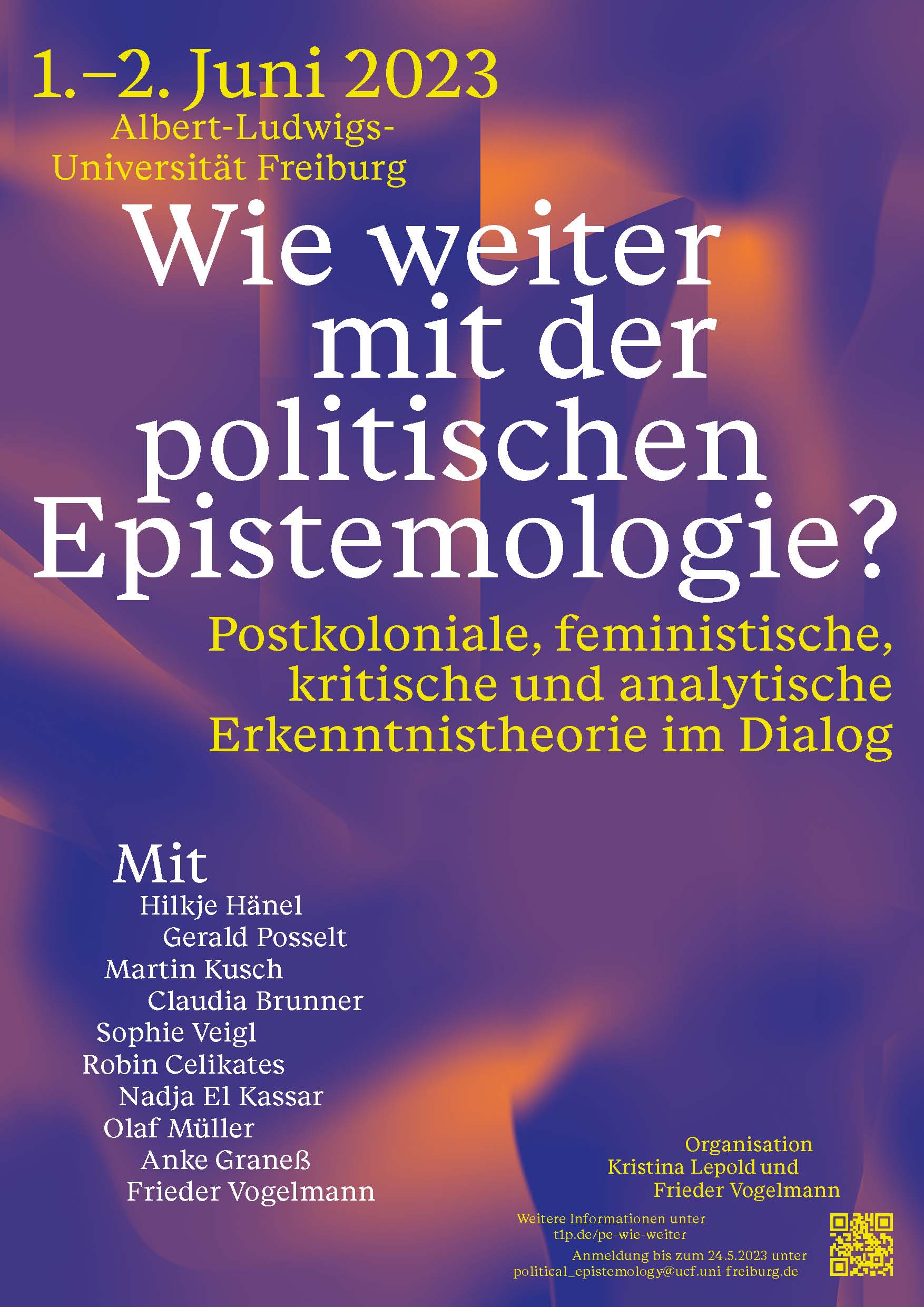Events
Coming up
Book presentation "Feministische Epistemologien" (January 9, 2025)
Prof. Dr. Frieder Vogelmann and Dr. Katharina Hoppe will present their edited volume „Feministische Epistemologien“ in a round-table discussion with Prof. Dr. Sabine Flick and Dr. Marion Mangelsdorf.
Feminist theories of knowledge and science emerge from extremely lively, interdisciplinary discussions in philosophy and the social sciences. They analyse how gender norms affect knowers, criticise the discrimination of female and queer people by dominant forms of knowledge and propose alternatives to common epistemic concepts and practices.
„Feministische Epistemologien“ brings together classic texts as well as current developments by Patricia Hill Collins, Sandra Harding and Donna Haraway, Miranda Fricker and Gurminder K. Bhambra, among others, most of them in German translation for the first time. They all share a core thesis: knowledge is situated in historically specific social practices and structures that are by no means gender-neutral.
When? January 9, 2025. 18:00-20:00
Where? HS 1015 (KG I)
(Presentation and discussion will be in German)

Previous Events
Vortrag Verena Erlenbusch-Anderson (University of Illinois Urbana-Champaign):
Racializing Terrorism
26.6.2024, 18-20 Uhr, Haus "Zur Lieben Hand", Großer Saal
In her talk, Verena Erlenbusch-Anderson explores the racialization of terrorism in the United States in the eighteenth and nineteenth centuries through changing discursive formations of race. She illuminates its function as a tool of social exclusion in the service of white supremacy and examines the continued relevance of contestations of terrorism as a means to preserve white rule and a practice of resistance against white supremacy.

Podiumsdiskussion: Was waren die Governmentality Studies?
Was waren die Governmentality Studies?
Eine Podiumsdiskussion
am 25.6.204, 18-20 Uhr
Universität Freiburg, Raum HS 1098, KG I
Brigitte Bargetz (Wirtschaftsuniversität Wien), Ulrich Bröckling (Universität Freiburg), Verena Erlenbusch-Anderson (University of Syracuse), Sven Opitz (Universität Marburg)
Moderation: Frieder Vogelmann (Universität Freiburg)
Aus Anlass von Michel Foucaults 40. Todestag diskutieren Brigitte Bargetz (Wirtschaftsuniversität Wien), Ulrich Bröckling (Universität Freiburg), Verena Erlenbusch-Anderson (University of Illinois Urbana-Champaign), Sven Opitz (Universität Marburg) über den Zustand der Governmentality Studies als letzte institutionell einschneidende Rezeptionsspur Foucaults diskutieren.
Wie stellen sie sich ca. 20-30 Jahre nach dem großen Hype Ende der 1990er/Anfang der 2000er Jahre dar?
Stimmt die mit dem Titel provokant lancierte These, dass dieses Forschungsprogramm mehr oder minder an sein Ende gelangt ist? Warum?
Welche Anschlüsse an andere Theorieprogramme bräuchte es? Was wäre eine spannende Agenda für die nächsten 20 Jahre? Und wie verhält sich dies zur Foucaultrezeption im Allgemeinen?
Institutional Virtues, Political Decision-Making,
and Communication under Uncertainty
15 March 2024, online (Zoom)
Organized by Melanie Altanian & Silvia Ivani
Please register by March 13th via email to uncertainties@proton.me.
The Zoom link will be provided upon registration.
Program
[All indicated times refer to Central European Time.]
| 09:45-10:00 |
Welcome and introduction, Melanie Altanian (University of Freiburg) |
| 10:00-10:55 |
Maru Mormina (European University Institute) | Evidence and expertise in times |
| 11:00-11:55 |
Melanie Altanian (University of Freiburg) & Silvia Ivani (University |
| 12:00-12:55 |
Ian James Kidd (University of Nottingham) | The fragility of institutional |
| 12:55-14:00 |
Break |
| 14:00-14:55 |
Sara Rubinelli (University of Lucerne) | Navigating the fog: strategies |
| 15:00-15:55 |
Jaana Parviainen (Tampere University) | Ignorance as resource and |
| 16:00-16:55 |
Jana Bacevic (Durham University) | Epistemic positioning, ambiguity |
| 17:00-17:30 |
Final discussion and goodbye |
Abstracts and bios
Maru Mormina | Evidence and expertise in times of crises: epistemic injustice and the manufacturing of ignorance in evidence-informed policymaking
Complex and interrelated crises define today’s policy space and pose particular challenges for deploying science to support evidence-informed policymaking (EIPM). Pandemics, climate change, natural catastrophes or energy crises demand science-based solutions, but also expose our inability to locate, discriminate, understand, and respond to incomplete and contested evidence. As COVID-19 demonstrated, crises expose the limits of EIPM. Elevating scientific knowledge and expertise to tame uncertainty obscures the challenges of deciding what needs to be asked, and ‘which’ or ‘whose’ science ought to provide the answers when contestation and disagreements emerge. This highlights the inevitability of ignorance in crisis policymaking, created by the exclusion - but also inclusion- of voices, facts and values from the decision-making processes. Acknowledging this raises difficult epistemic, but also ethico-political questions regarding how to manage the boundary between what /who is included and what/who is excluded, and the potential for epistemic and social injustices that lies therein.
In this paper, I draw on examples from the past COVID-19 pandemic to develop an account of how knowledge and ignorance shape public policy. Considering ignorance as an inevitable input in the policy process challenges EIPM’s rigid positivistic assumptions and paves the way for more inclusive and deliberative forms of crisis governance better equipped to deal with unknowns.
Maru Mormina is an interdisciplinary scholar, with training in the sciences and the social sciences. Her research is concerned with the relationship between strategic ignorance and epistemic injustice, and how these might shape processes of scientific knowledge production and of knowledge use in evidence-based policy, particularly in public health.
Melanie Altanian & Silvia Ivani | A critical (re-)assessment of institutional epistemic humility: lessons from a pandemic crisis
During the Covid-19 pandemic, political decisions about public health measures were often taken in the face of uncertainty because of disagreements among experts, mixed scientific results, and competing economic and social values (e.g., individual autonomy, protecting vulnerable groups, and unemployment). Against this background, some have argued for institutional epistemic humility as an appropriate mode of governance that enables to accommodate uncertainty, or ignorance, without losing (epistemic) justification and political legitimacy. In our paper, we critically re-assess this mode of governance and consider its limitations and effects on the public, by comparing it to a mode of governance called medical populism. We shall compare and discuss the following dimensions of political decision-making and communication in particular: maintaining political legitimacy, effectiveness of measures, adherence to measures, and cultivating competencies of democratic citizenship.
Melanie Altanian is Assistant Professor at the University of Freiburg, Chair of Epistemology and Theory of Science. Previously, she was a guest lecturer and research assistant at University College Dublin, School of Philosophy. Her monograph The Epistemic Injustice of Genocide Denialism is forthcoming with Routledge (2024).
Silvia Ivani is teaching fellow at University College Dublin. Her research has been focused on exploring how cognitive and non-cognitive values may legitimately influence decisions in science and the role of respect in the interactions between scientific experts and lay communities.
Ian James Kidd | The fragility of institutional epistemic virtues
In this paper, I discuss the idea of institutional epistemic virtues by discussing the policies enacted by Global North political and healthcare institutions during the Covid-19 pandemic. I start by noting several interrelated epistemic failings of most Global North governments: the abandonment of established precedent for pandemic management; the failure to consult an appropriately diverse range of disciplines; the wilful suppression of alternative policies and reasonable critical perspectives; and failures to acknowledge the vastly destructive effects of lockdowns and other pandemic policies, especially in the Global South. I then turn, in the second part of the talk, to the question of why these failings were not more widely challenged by people one would have assumed to have been critical. After describing several possibilities, I end by emphasising the disturbing fragility of alleged institutional epistemic virtues.
Ian James Kidd is an associate professor in philosophy at the University of Nottingham. His research interests include social epistemology, virtue and vice theory, and misanthropy. He was co-editor (with Heather Battaly and Quassim Cassam) of Vice Epistemology and (with Gaile Pohlhaus Jr. and Jose Medina) of The Routledge Handbook to Epistemic Injustice. His website is www.ianjameskidd.weebly.com.
Sara Rubinelli | Navigating the fog: strategies for institutional health communication in uncertainty and disinformation
In the realm of public health, conveying information amidst uncertainty stands as a pivotal challenge. This talk explores the complexities of health communication under uncertain conditions, focusing on the proliferation of disinformation and institutional strategies to counteract this issue. Through the analysis of case studies, patterns of optimal and suboptimal health communication practices are identified. The findings highlight that transparent, consistent communication and the engagement of credible sources play crucial roles in mitigating the spread of misinformation. Moreover, the adoption of epistemic humility by institutions is emphasized as essential, advocating for an acknowledgment of uncertainties while maintaining public trust and compliance.
The research suggests that proactive strategies, including the development of clear communication protocols and active misinformation debunking, significantly enhance health communication efficacy. This presentation outlines actionable insights for institutions to refine their communication approaches, thereby improving political and scientific legitimacy, building public trust, and contributing to resilient societal health outcomes.
Sara Rubinelli is Full Professor of Health Communication and Vice-dean of the Faculty of Health Science and Medicine of the University of Lucerne. She is also group-leader in Person-Centered Communication at Swiss Paraplegic Research and scientific advisor for the World Health Organization.
Jaana Parviainen | Ignorance as resource and the communication of political decisions in the age of crises
Traditionally, politicians have liked to appear in public as all-knowing. When facing increasingly complex social and ecological problems, they cannot avoid confronting their own ignorance, incompetence, or failures. The rise of populist movements in Europe, America and Asia has shown that some leaders simply reject scientific evidence and expert knowledge. Using examples from the coronavirus pandemic, especially the actions of the Finnish government in the Spring 2020, I examine how ignorance and non-knowledge can be used as a resource in political decision-making when justifying decisions and communicating about them to citizens. Drawing on insights from social epistemology and the emerging interdisciplinary field of ignorance studies, my presentation focuses on the temporality of non-knowledge in decision-making, e.g., the role of scenarios and predictions as ‘not-yet-known’. Illustrating my epistemic analysis with media material and press releases by the Finnish government, my paper proposes that making decisions under uncertainty requires new forms of rationality, justification, legitimation, and observation of consequences.
Dr. Jaana Parviainen is a philosopher and a senior researcher at Tampere University, the Faculty of Social Sciences. Her philosophical expertise covers social epistemology, the philosophy of technology, and the phenomenology of embodiment. Parviainen’s research has been published in journals such as Social Epistemology, Synthese, and Ethical Theory and Moral Practice.
Jana Bacevic | Epistemic positioning, ambiguity and injustice: how not to communicate under uncertainty
Why do politicians tolerate and sometimes even actively pursue ambiguity? Scientific consensus is that reducing ambiguity is key to successful communication in the context of global crises, such as climate change and pandemics such as Covid-19. This paper explores the political and epistemological parameters and consequences of contexts in which politicians diverge from this advice. Building on the concept of 'politics of impossibility' in the context of Covid-19 pandemic in the UK (Bacevic&McGoey, 2024; Bacevic 2020) and the concept of epistemic positioning (Bacevic 2021), it focuses on the constitution of political subjectivities and spaces for agency through the selective enrolment of ambiguity.
Jana Bacevic is assistant professor at Durham University and Associate Editor of The Philosopher, UK's longest-running public philosophy journal. Jana's work is in social and political theory and the politics of knowledge production, including prediction and forecasting; she has published extensively on this, including the use of scientific evidence in the context of the Covid-19 pandemic.

Wie weiter mit der politischen Epistemologie?
Postkoloniale, feministische, kritische und analytische Erkenntnistheorie im Dialog
1.-2. Juni 2023 an der Albert-Ludwigs-Universität Freiburg
Raum 4 im Peterhof, Niemensstraße 10, 79098 Freiburg
organisiert von
Kristina Lepold & Frieder Vogelmann
Programm
|
1. Juni 2023 |
|
|
|
14:00–14:30 |
Begrüßung Kristina Lepold (HU Berlin) & Frieder Vogelmann (Universität Freiburg) |
|
|
14:30–15:30 |
Anke Graneß (Universität Hildesheim): Zum Verhältnis zwischen epistemischer und globaler sozialer Gerechtigkeit |
|
|
15:45–16:45 |
Claudia Brunner (Universität Klagenfurt): Wissen(schaft) und Gewalt(freiheit). Konzeptionen epistemischer Gewalt am Schnittpunkt herrschaftskritischer Sozial-, Kultur- und Geisteswissenschaften |
|
|
16:45–17:15 |
Pause |
|
|
17:15–18:15 |
Hilkje Hänel (Universität Oldenburg): Politische Epistemologie als Nicht-ideale Epistemologie |
|
|
18:30–19:30 |
Martin Kusch (Universität Wien): The Political Metaphysics of Scientific Knowledge |
|
|
|
||
|
2. Juni 2023 |
|
|
|
9:30–10:30 |
Frieder Vogelmann (Universität Freiburg): Wahrheit als Kraft, materialistisch gedacht |
|
|
10:45–11:45 |
Gerald Posselt (Universität Wien): Wahrheitspolitik und politische Epistemologie |
|
|
12:00–13:00 |
Olaf Müller (HU Berlin): Neopragmatistische Erkenntnislehre am Beispiel des Pazifismus |
|
|
13:00–14:30 |
Mittagessen |
|
|
14:30–15:30 |
Sophie Veigl (Universität Wien): Über die (Un)Möglichkeit irreduzierbar epistemischer Unterdrückung |
|
|
15:45–16:45 |
Nadja El Kassar (Universität Luzern): Individuell und strukturell? Neue Perspektiven auf Unwissenheit |


